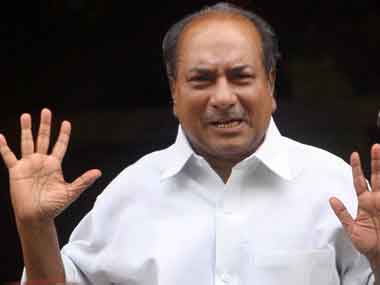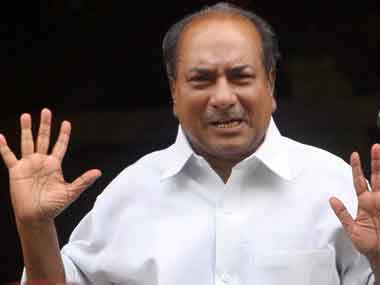Trust the Congress to misdiagnose its problems and settle for wrong remedies. The party has been in a state of intellectual confusion for quite long now and AK Antony’s remark, that its secular image has taken a beating as the party is perceived to be battling for minorities only, is symptomatic of that. Before we get deeper into the analysis, here’s a caveat: it is possible that the utterance was specific to the state of affairs in Kerala; superimposing that on the national scenario distorts the context and the reality. The entire ‘secularism’ debate — particularly its link with electoral politics — is largely nonsensical. It is grooved in the political-social dynamics of the pre-1990s era. It has been close to a quarter of a century that the Congress has lost the support of the minorities. It coincides with its electoral marginalisation in states with a large concentration of minorities — let’s be more direct, the Muslims. The community has shifted loyalty to regional parties and no more views the Congress as a viable choice. Again, it has been proved again and again that the Muslim monolithic vote bank is a myth and the community does not vote en bloc for specific parties unless it’s an extraordinary situation. For some malicious reason, the ‘secularism’ debate hardly takes these into account. [caption id=“attachment_1596009” align=“alignleft” width=“380”]
 AK Antony in a file photo. PTI[/caption] The intellectuals can make asinine arguments, but can a political party which has to grow and survive among people afford to do that? The right question for Antony to ask would have been ‘why are the minorities not with us? Why have they drifted to the Samajwadi Party in Uttar Pradesh, Left and Trinamool Congress in West Bengal, to the Dravidian parties in Tamil Nadu and to the Rashtriya Janata Dal in Bihar?’ He is theoretically right in arguing that pandering to Muslims has created space for discontent among the larger community and offered scope for other parties — read the BJP — to take advantage of that. But it fails to take into consideration the pan-Indian ground reality. The underlying assumption in his remark is Muslims are still with the Congress and that is creating resentment in the larger community. It ignores the fact that the party has done little to regain the loyalty of the community and is not even its party of preference. While the theory of Muslim appeasement by the party has been aggressively circulated by political rivals, it has done little to blunt that. In the end it has support neither in the Muslim community nor in the larger community, both of whom are distrustful of its intentions. It is also based on another flawed assumption that elections in the country are fought on the issue of secularism — it has lost relevance over time and been overtaken by other considerations. The results in the general election were not, as senior BJP leader LK Advani would have us believe, a verdict against Congress’ flawed approach to secularism. It does not explain why the BJP has been busy wooing the community. The reality is, in the battle ground states, the Congress has no minority support; the results only vindicated that. After Antony’s statement the Congress is likely to recalibrate its minority approach. It is not clear how. But a muddled diagnosis can only lead to a muddled remedy. Perhaps a wise step on its part would be to move beyond this secular-communal paradigm and stop pegging its entire approach on the sense of insecurity among Muslims. If the party is credible enough the minorities will revert to it when they feel threatened by forces in the majority community. It has to regain credibility first. The worldview of the 90s won’t simply work in the present.
AK Antony in a file photo. PTI[/caption] The intellectuals can make asinine arguments, but can a political party which has to grow and survive among people afford to do that? The right question for Antony to ask would have been ‘why are the minorities not with us? Why have they drifted to the Samajwadi Party in Uttar Pradesh, Left and Trinamool Congress in West Bengal, to the Dravidian parties in Tamil Nadu and to the Rashtriya Janata Dal in Bihar?’ He is theoretically right in arguing that pandering to Muslims has created space for discontent among the larger community and offered scope for other parties — read the BJP — to take advantage of that. But it fails to take into consideration the pan-Indian ground reality. The underlying assumption in his remark is Muslims are still with the Congress and that is creating resentment in the larger community. It ignores the fact that the party has done little to regain the loyalty of the community and is not even its party of preference. While the theory of Muslim appeasement by the party has been aggressively circulated by political rivals, it has done little to blunt that. In the end it has support neither in the Muslim community nor in the larger community, both of whom are distrustful of its intentions. It is also based on another flawed assumption that elections in the country are fought on the issue of secularism — it has lost relevance over time and been overtaken by other considerations. The results in the general election were not, as senior BJP leader LK Advani would have us believe, a verdict against Congress’ flawed approach to secularism. It does not explain why the BJP has been busy wooing the community. The reality is, in the battle ground states, the Congress has no minority support; the results only vindicated that. After Antony’s statement the Congress is likely to recalibrate its minority approach. It is not clear how. But a muddled diagnosis can only lead to a muddled remedy. Perhaps a wise step on its part would be to move beyond this secular-communal paradigm and stop pegging its entire approach on the sense of insecurity among Muslims. If the party is credible enough the minorities will revert to it when they feel threatened by forces in the majority community. It has to regain credibility first. The worldview of the 90s won’t simply work in the present.
Congress and the minorities: Why Antony gets the diagnosis wrong
Akshaya Mishra
• June 30, 2014, 18:42:12 IST
Trust the Congress to misdiagnose its problems and settle for wrong remedies. The party has been in a state of intellectual confusion and the remark by AK Antony that its secular image has taken a beating as the party is perceived to be battling for minorities only is symptomatic of that.
Advertisement
)
End of Article